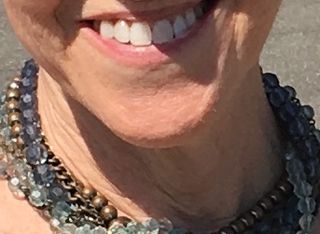
Media
Smiling in Photos Makes People Look Older, Study Shows
The idea that smiling in photos makes people look younger is a myth.
Posted May 11, 2017

Well, here's a small research finding I really wouldn't have expected: It turns out that when you pose for photos with a wide smile, you're actually making yourself look older. And all this time I thought I looked so much better in photos than in real life precisely because those photos showed me at my smiliest. I always thought that a smile would not only give me the appearance of cheekbones I didn't have, but it would mask the fact that those lines around my eyes and mouth weren't just lines attached to the smile itself, but were with me even in Resting Bitch Face mode. I thought the smiles in those photos made me look younger.
Oddly, the subjects involved in the study at Israel's Ben-Gurion University also thought that smiling made people look younger. But according to the report published online last week at Psychonomic Bulletin and Review, the subjects were wrong about how they themselves responded to a series of photos that they were asked to rank from oldest to youngest.
The subjects, 40 students at Ben-Gurion University, were shown pictures of smiling faces, neutral expressions, and surprised looks. They ranked surprised expressions as the youngest, and smiling faces as the oldest. But when they were asked afterward to remember their rankings, they were sure they had said the youngest ones were the ones who had been smiling.
“Popular media promotes the idea that smiling makes you look younger,” study co-author Tzvi Ganel, head of Ben-Gurion's Laboratory for Visual Perception and Action, was quoted as saying in a press release from Ben-Gurion University. “Look at all of the smiling faces in skincare and dental ads. How many of us post smiling faces on social media?”
Ganel's co-author was Melvyn Goodale, director of the Brain and Mind Institute at Western University in Canada.
What explains the disconnect? The researchers think it's because of the wrinkle lines around the eyes that emerge when a person smiles—and that disappear when a person opens up in an expression of surprise. But one thing this study shows me is that you should just smile because you want to, because it makes you feel good—not because you're fooling anyone about those eye crinkles and nasolabial folds.
References
Ganel, Tzvi and Melvyn A. Goodale, "The effects of smiling on perceived age defy belief," Psychonomic Bulletin and Review, published online May 8, 2017, DOI 10.3758/s13423-017-1306-8.

